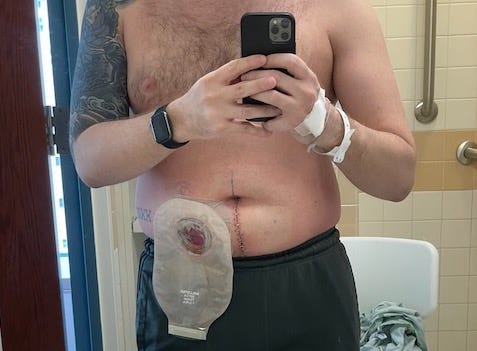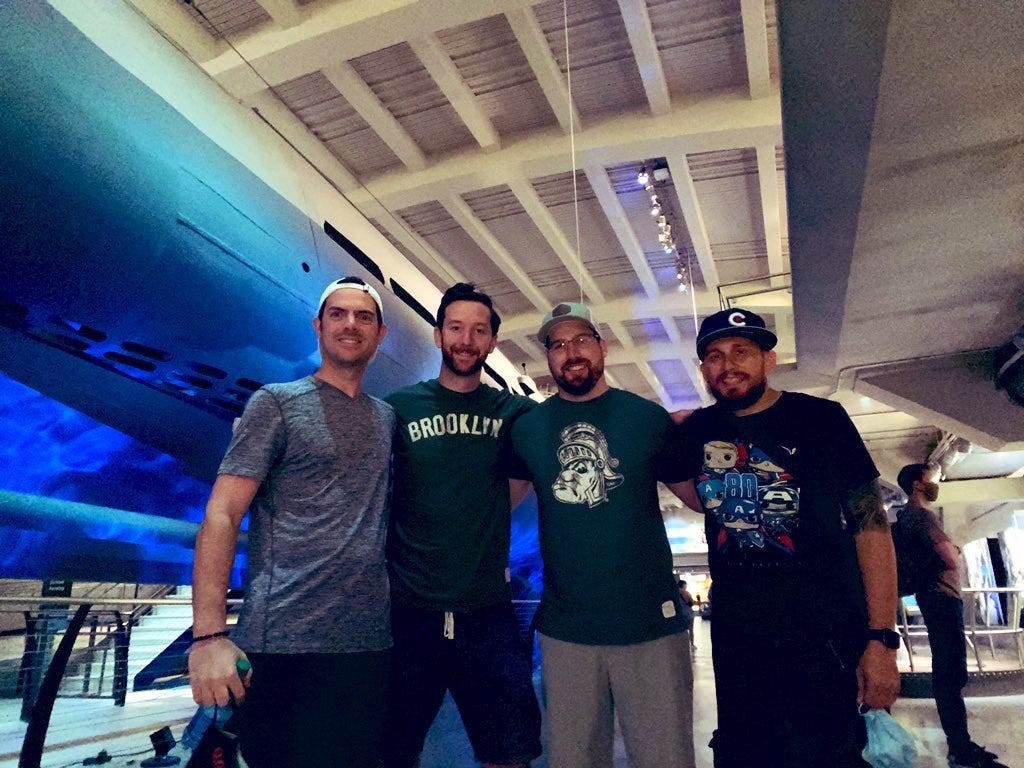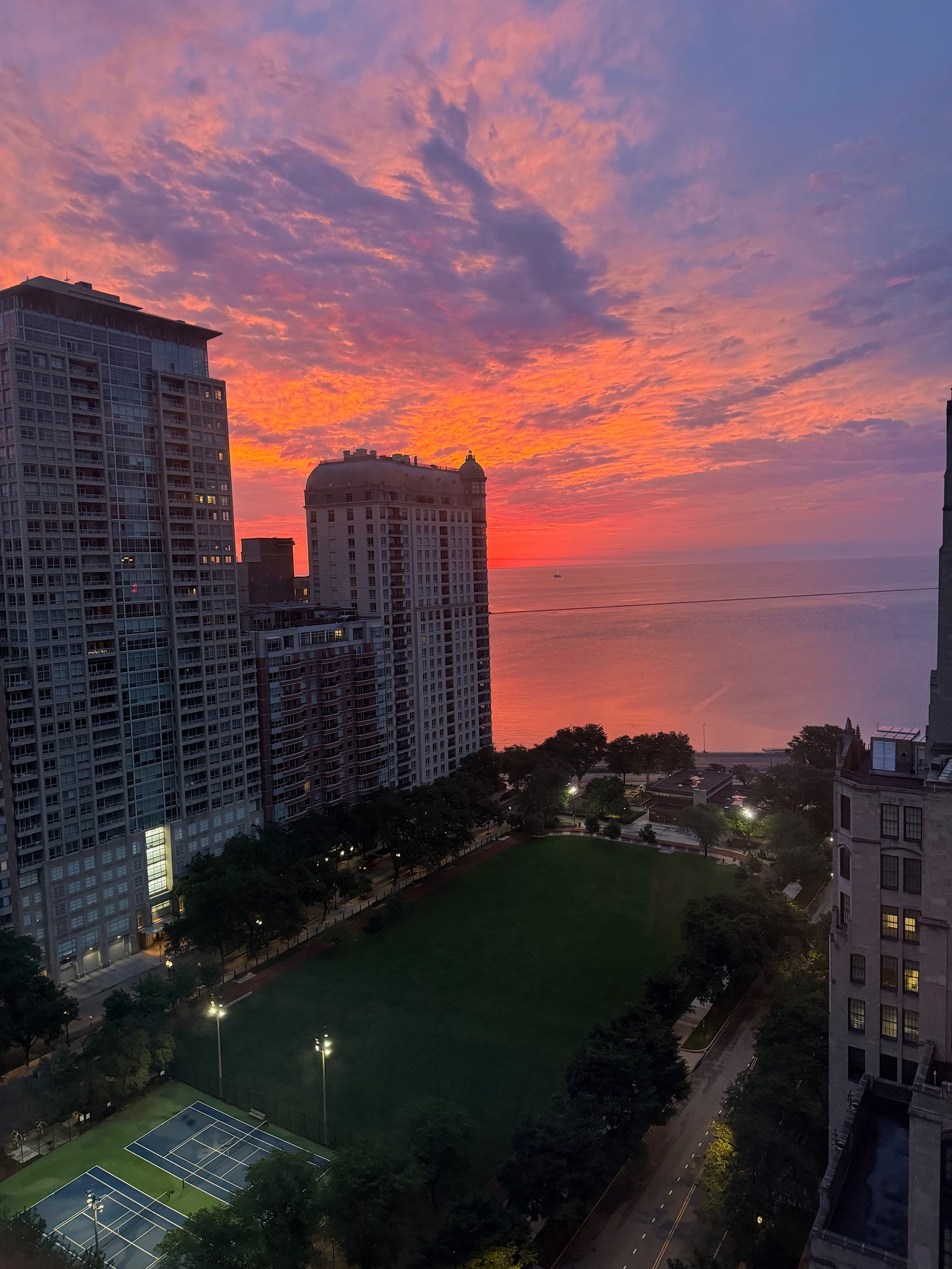My Cancer Timeline
This timeline was originally posted in my April 2023 Update post, but I have since pulled it into it’s own page and will periodically update this with new entries as a way to present and preserve a record of my long-term battle with cancer.
Timeline Entries are organized by month to make this content easier to consume.
December 2020: I first notice symptoms (constipation) that will eventually be diagnosed as Stage IV cancer while home for Christmas. I attempt to address the problem using over-the-counter options but by New Years Eve, I accept that I should go see the doctor.
January 2021: After two visits with my family doctor, I’m referred to a colorectal specialist with the AMITA Health Care Network. The earliest consult appointment with the specialist is for the end of February.
February 2021: Symptoms begin to impact my plans and daily routine. A previously planned trip to Mexico with my then-girlfriend is scaled back so we don’t venture beyond the resort, and the 2021 boys trip to Colorado was the tipping point where the symptoms progressed into physical pain. After a consult with the specialist, a colonoscopy is scheduled for the end of March.
March 2021: Physical pain sends me to the AMITA’s Emergency room twice at the beginning of the month. Neither visit produces a diagnosis of my problem, and the ER refuses to provide any kind of pain medication for my physical discomfort (opioids worsen constipation). One hour prior to my scheduled colonoscopy, I’m informed by the hospital that my procedure was cancelled due to a positive covid test. Because I showed no symptoms, I immediately seek a second test to validate if I’m asymptomatic. That second test returns negative and the hospital reschedules my colonoscopy… for the end of April 🤬.
April 2021: The only relief I have from the pain is to take hour-long hot baths, multiple times each day. At this point, symptoms have overtaken daily life and I’m unable to socialize or work in a meaningful way. My then-girlfriend convinces me to seek a second opinion with Northwestern Medicine, citing their status as a world-class health system. I arrive at Northwestern’s ER department on April 14 and they immediately discover a 13cm tumor blocking my digestive tract. I am transferred to inpatient care and begin a two-week stay at the hospital. My diet is restricted to chicken broth, Ensure, and water to avoid compounding the backlog of waste blocked by the tumor. I undergo a week of tests (Colonoscopy, MRI, etc) before my Colorectal surgeon Dr. Mohammad Abbass performs a diverting loop sigmoid colostomy, restoring my ability to eat normally.
May 2021: This was rock bottom on my journey. While the surgery is successful, it requires me to wear a bag to go to the bathroom, and I still have an uncontrolled tumor growing in my colon. Pain management requires a high volume of Oxycontin with medical marijuana to bridge the gap between doses. My romantic relationship ends shortly after being discharged from the hospital and I’m left alone at a time when I’m forced to contemplate my mortality. I make the choice to not focus on what I’ve lost, and instead focus on becoming 1% better every day. Once I’m sufficiently healed from surgery, I undergo two additional outpatient procedures to install a port in my chest and kidney stent.
June 2021: I’m served a reminder about the seriousness of my diagnosis when my Aunt Colleen passes away from her battle with cancer days before my first treatment. My Oncologist, Dr. Aparna Kalyan begins treating me with chemotherapy every two-weeks to attack the cancer in my body. The 48-hour IV treatment immediately addresses the pain I was experiencing, but the drugs themselves take a toll on my quality of life. I’m unable to drink liquids colder than room temperature, I experience a frequent & uncontrollable nausea, and develop nerve damage in both my hands and feet. In addition to my treatment plan, I begin participating in a clinical trial studying the benefits of Vitamin D on colon cancer.
July 2021: I receive a Medical Marijuana license from the state of Illinois. Marijuana had already been a part of my treatment plan, but as a qualified medical patient, my in-state dispensary expenses are now reduced by 40%. The cumulative impact that cancer has on my professional performance in 2021 forces me to forgo the annual raise I normally receive, impacting both my current and future earnings.
August 2021: I develop additional side effects from treatment, with hiccups so intense that I would suffocate for brief periods of time (incredibly scary). My best friends Evan Clough, Chris Bradley, and Tyler Probst come to Chicago for a long weekend to boost my spirits; we go to the S&I Museum & a Cubs game. The series of treatments takes its toll on my immune system and we’re eventually forced to pause for a round. I’m given an injection of Neupogen, which was very effective in rebounding my immune system, but also extremely painful in the days that followed.
September 2021: My lab results stabilize, and I find myself in a healthy enough position socialize more frequently. The kidney stent is removed.
October 2021: I feel healthy enough that I resume my gym membership and begin a physical therapy of-sorts to regain the fitness I had before the pandemic and cancer. I begin taking 1 class a week but am prone to rolling my ankle frequently due to the nerve damage in my feet. I am finally free of the fog from using so many opioids in the spring and my mental capacity returns to 100%.
November 2021: Dr. Kalyan delivers good news that the treatments have so far been successful and that we can start working towards reversing the colostomy surgery. I discontinue taking Oxaliplatin to stop the progression of nerve damage.
January 2022: I receive a reality check when asking Dr. Kalyan about my remaining treatment plan. Best case scenario, treatment is measured in years, but it’s possible I require treatment for the remainder of my life. The cancer test Signatera is added to my treatment plan within days of FDA approval, providing a new signal by measuring how many cancer cells I shed into my bloodstream.
March 2022: Dr. Abbass schedules me for a colonoscopy to evaluate if I’m ready to have the colostomy surgery reversed. The colonoscopy results show promise, but Dr. Abbass errs on the side of caution and recommends a second colonoscopy after a few cycles of treatments and scans. The nerve damage in my feet finally improves enough for me to exercise 4-5 days per week.
April 2022: My oncology team orders a new genetic test from Tempus, a Chicago-based health startup enabling more data-driven decision making with cancer treatments. Coolest thing about this test? My close friend/business partner Hunter Lane is the Senior Director of Product at Tempus, and contributed to bringing this test to market. Because of the work of Hunter (and all of Tempus), I now have an immunotherapy option should my cancer become resistant to chemotherapy.
May 2022: Hospital systems across America experience a shortage of contrast dye used for CT scans. My routine scan is delayed 1 month to prioritize those who are less healthy than myself. I end up being interviewed by the New York Times regarding the dye shortage, but my story does not make the published version of the article.
August 2022: Dr. Abbass performs a second colonoscopy towards the end of the month.
September 2022: Dr. Abbass schedules me for an colostomy reversal in November. To prep for surgery, the drug Avastin is removed from my chemotherapy treatment plan.
October 2022: I travel for the first time while actively receiving chemotherapy to be in attendance when my close friend Aaron Coney received the Haworth College of Business Emerging Leader Alumni Award from our alma mater. As a former student employee of WMU’s athletic department, I arrange all-access field passes for Aaron and myself to the football game that weekend. While on the sidelines, I run into Jim Culhane, formerly WMU’s hockey coach; now Senior Director of Athletics Advancement.
November 2022: I check-in to Hotel Northwestern a second time for a three-day stay to have my colostomy reversed. I declare victory with this milestone achievement as it restores the quality of life I had prior to the onset of symptoms. I’m also referred for acupuncture to help rehabilitate the nerve damage in my feet, but the treatments don’t produce the desired results after several weeks and I decide not to continue.
December 2022: Out of an abundance of caution, I check-in to Northwestern’s ER due to pain and unease with the look of my surgical wound. A CT scan verifies that the internal stitching is still intact, and the pain subsides a week later. I complete my recovery by the end of the month, and Dr. Abbass schedules a follow-up colonoscopy for mid 2023.
January 2023: With surgical recovery complete, Avastin is added back to my chemotherapy treatment plan. My routine CT scan returns a result showing a small, but measurable amount of cancer growth. Dr. Kalyan elects not to alter my treatment plan right away, instead waiting for my next CT scan to see if the observation is an outlier or a trend.
March 2023: My next CT scan validates the growth trend observed in January, and Dr. Kalyan alters my treatment plan. I’m taken off the clinical study after 24 months and Camptosar (Irenotecan) is added to my routine. I begin to experience challenging side effects again as a result of the changes (sans nerve damage).
April 2023: I enter my third year as a Stage IV Colon Cancer survivor, and celebrate all the hard work by spending a long weekend with friends attending the Coachella Music festival in Southern California. Side effects continue to be a challenge, but I manage.
July 2023: Embracing the long-term relationship I now have with cancer, I join the associate board of Chicago-based 501c3 charity Culinary Care as a way to give back to the community.
September 2023: After seeing sufficient progress on my scans, my oncologist reduces the amount of Camptosar I’m receiving to help lessen the side effects I continue to endure. Towards the end of the month, I’m offered the opportunity to participate in my second clinical trial involving Hydroxychloroquine and FOLFOX, which I accept.
October 2023: Before I can start the clinical trial, I meet with an Optometrist to establish a baseline health of my eyes as long-term use of Hydroxychloroquine is known to negatively impact eye sight. Dr. Abbass also has me undergo a colonoscopy to get a visual look at how my colon is doing. The results of that scope align with what’s been observed with CT scans.
November 2023: Culinary Care hosts its annual Gourmand Gala at Chicago’s Union Station. The event sells out with over 700 attendees and raises over $230,000 that will be used to help feed nutritious meals to cancer patients while they receive treatment in-clinic.
December 2023: Shortly before Christmas, I exit the clinical trial as recent scans and worsening quality of life indicate the treatment is not working. The clinical trial is replaced with an immunotherapy drug called Vectibix, in addition to chemotherapy drugs Irenotecan and Fluorouracil.
January 2024: While the immunotherapy treatment provides immediate relief, several new side effects surface and my care team expands to include specialists in Dermatology, led by Dr. Jeanifer Choi. Dr. Abbass has me undergo a flex sigmoidoscopy to get a visual look at my colon after dropping out of the recent clinical trial.
February 2024: I launch the Cancer Culture brand after spending a few weeks building an e-commerce store to sell apparel for cancer survivors, supporters, and patient-providers. Dr. Kalyan has me undergo a Biopsy so new samples can be collected and studied.
April 2024: I inform Dr. Kalyan of the decreased quality of life I begin to experience as use of the Vectibix continues. Dr. Kalyan lays out a broad plan on next steps that we can pursue and coordinates with my colorectal surgeon Dr. Abbass to get those plans in motion.
May 2024: I undergo an additional flex sigmoidoscopy so Dr. Abbass can assess the portion of my colon where the excessive bleeding it taking place. After that scope, Dr. Kalyan proceeds with referring me to the Radiation Oncology department for a short series of treatment.
June 2024: I kickstart June with 2-weeks of daily radiation therapy, which surfaces its own set of side effects to address. Shortly after completing the treatment series, my quality of life begins to decline further and I find myself dealing with symptoms like a dramatic increase in pain, a decrease in appetite/sleep, and in inability to perform functions expected of me daily. After about a week straight of declining symptoms, I opt to visit the ER at Northwestern Medicine to get additional eyes on the situation and are quickly transferred to inpatient care for examination. Blood labs reveal that my Bilirubin count is 16x the normal range, indicating a major issue with my body processing and expelling toxins. Over the course of 9 days, Northwestern places a kidney stent and pumps over 10 liters of fluid out of my abdomen to alleviate the problem before I’m finally sent home at the end of the month.
July 2024: While I may be home from the hospital, I’m far from recovered from the ordeal and have to visit the Northwestern campus multiple times a week for different procedures and follow-ups. Physically, I lost 50 lbs. during the month of June and find myself without any strength or endurance. Tasks as simple as walking the length of my home unassisted are a struggle, and my girlfriend Amanda serves as my daily caretaker for the majority of the month. While the setbacks are challenging, we do observe that I am slowly getting better and making notable progress each week towards recovery.
August 2024: I begin to push towards reducing my dependency on treatments that were in response to my radiation therapy setbacks, scheduling fewer paracentesis appointments in August for fluid reduction in addition to discussing a step-down plan on pain management. At the end of the month, I undergo an ERCP and have a stent in my bile duct replaced to keep it open and processing toxins out. My body adapts decently to the change in chemotherapy drugs since going back to Oxaliplatin, Avastin, and 5FU, but it’s becoming more noticeable with each passing round that nerve damage in my hands and feet are returning. Outside of the clinic, I’ve had struggles of late maintaining a healthy weight and have been working on normalizing an eating habit that works with the responses of my body. Since May, I’m down over 50lbs and have watched my waistline shrink by 4”. If those were results of a specific goal and not side effects of my challenges, I would be ecstatic, but this isn’t that situation.







